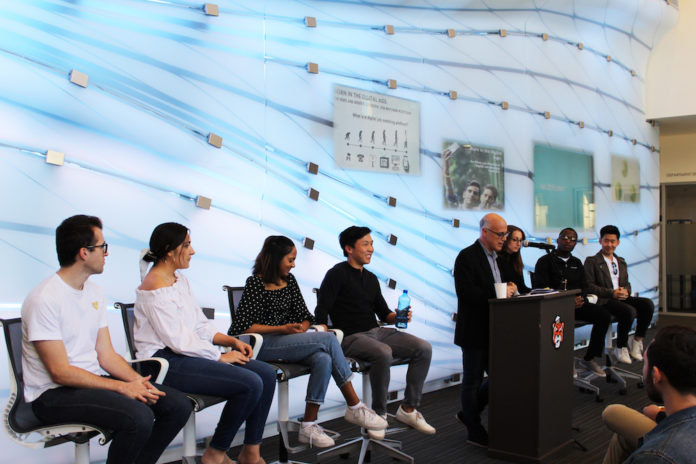
The Diplomacy & World Affairs (DWA) department hosted 11 events as part of the Kahane United Nations (UN) week Feb. 10–14. Throughout the week, the program showcased students, faculty and scholars addressing the climate crisis. UN Week was funded by the Kahane fund and hosted by faculty from the DWA department in conjunction with the UN Week Student Team, led by Zoobia Jilani (junior).* The events of the week included a talk by professor Adam Schoenberg about his concerto inspired by climate change, titled “Losing Earth,” as well as Alison Hirsch and Aroussiak Gabrielian’s design presentation, “Climate Imaginaries.” It also featured panels on student activism, indigenous activism and climate change policy. The week concluded with a community dinner and screening of Anabel Gullo’s (junior) short film “The City and the Sea.”
Stella Hong (sophomore) was a part of the UN Week Student Team that helped organize the events.
“It was really cool just not only being part of [the] social media [team] but because it was a very horizontal system,” Hong said. “In a way, we were all able to give feedback for everything.”
Hong was one of about a dozen students that planned and implemented the week’s programming. Although she worked specifically on social media and outreach, she said committee members were involved in all aspects of planning. Hong joined the committee to be more involved in the DWA department on campus. However, she said the events, as well as the issues, are not just for DWA majors.
“There’s so many ways for people to get involved, and I hope that they know there’s no limitations,” Hong said.
Keynote speaker Dr. Steven Were Omamo spoke about his work as Representative and Country Director for the UN World Food Programme (WFP) in a presentation titled “Water, Markets, and Peace – Environmental Justice through a Food Security Lens“ Feb 13. According to Omamo, his experience in Ethiopia showed water accessibility can be a concern even when water availability is not. He said he found that both water availability and water accessibility are correlated with peace in the region.
Jasmin Vargas, senior organizer with Food and Water Action, and Politics professor Michael Sardo spoke on a panel titled “Los Angeles and Climate Change.” They discussed how climate change can be combatted locally in LA, as well as the intersection of environmental justice and social justice and how it affects local issues from transportation to housing.
“You can go learn about what justice is, but also, you know it in your heart, you feel it,” Vargas said. “At the end of the day, what it looks like on the ground here in LA is creating real climate solutions by creating clean energy green jobs here in LA for the people of LA. It needs to be a global problem that we answer locally.”
The panelists discussed how grassroots activists are working with communities in LA to advocate for policies and practices that support environmental justice. Action need not be exclusive to giant climate movements, Sardo said. He said people can make an impact on the issues they are already passionate about if they question how environmental justice can work with them.
DWA professor Anthony Chase headed faculty involvement in the week’s events. He said one of the goals for the program was to make it as interdisciplinary as possible by encouraging involvement from multiple departments.
“There’s really a lot of connections between our different disciplines,” Chase said. “Specifically, studying the political economy and climate change — that can be addressed from a lot of different academic disciplines.”
Chase said another goal for the program was to center student involvement. He said this was accomplished by the UN Week Student Team.
“The idea here is not just that we would consult the students, [but] that really, they would own the program,” Chase said.
The UN Week Student team hosted a quad fair Feb. 11, where student organizations such as Active Minds and Food Energy And Sustainability Team (FEAST) shared their take on climate-related issues. Occidental Student Compost Association (OSCAR) handed out campus maps that highlighted compost sites. Oxy Democrats evaluated Democratic presidential candidates based on climate and environmental based positions. Challah for Hunger was joined by Food Forward to promote a volunteer trip for students to help redistribute unused food to those in need.
Naomi Field (senior) is president of the Renewable Energy and Sustainability Fund (RESF) and was a speaker on the panel “Student Activism & Campus Sustainability.” She said she thinks there is still a lot the college and students can improve in terms of sustainability.
“I think it’s really important to make the point that environmentalism, food justice and everything involved with environmentalism is social justice,” Field said.
*Jilani is a Community News editor for The Occidental.
![]()






























